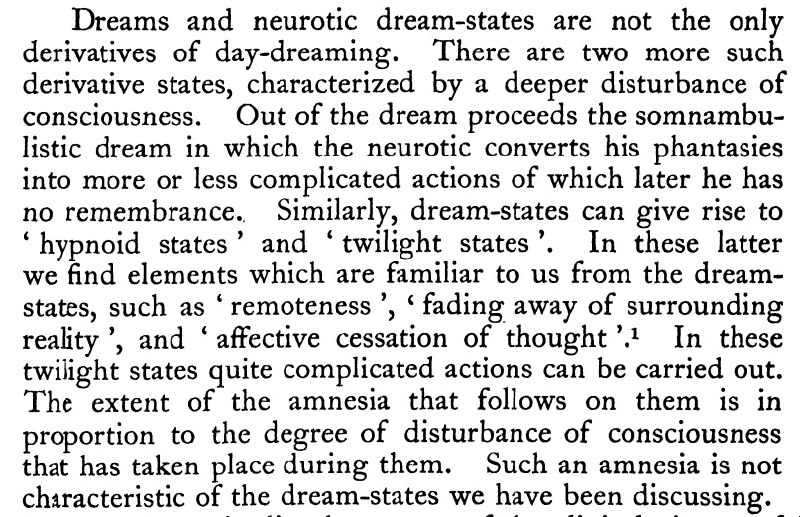Symptoms
Contact: @DivyaRanjan1905
Member of @CommunistPact
Community chat: https://t.me/hamster_kombat_chat_2
Website: https://hamster.network
Twitter: x.com/hamster_kombat
YouTube: https://www.youtube.com/@HamsterKombat_Official
Bot: https://t.me/hamster_kombat_bot
Last updated hace 11 meses, 1 semana
Your easy, fun crypto trading app for buying and trading any crypto on the market.
📱 App: @Blum
🤖 Trading Bot: @BlumCryptoTradingBot
🆘 Help: @BlumSupport
💬 Chat: @BlumCrypto_Chat
Last updated hace 1 año, 4 meses
Turn your endless taps into a financial tool.
Join @tapswap_bot
Collaboration - @taping_Guru
Last updated hace 11 meses, 3 semanas

Karl Abraham, Hysterical Dream-States (1910)
Melanie Klein talking to students at the British Psychoanalytical Society (1958)
In the dark, a child might ask, What is the world?
just to hear his sister
promise, An unfinished wing of heaven,
just to hear his brother say,
A house inside a house,
but most of all to hear his mother answer,
One more song, then you go to sleep.
How could anyone in that bed guess
the question finds its beginning
in the answer long growing
inside the one who asked, that restless boy,
the night's darling?
Later, a man lying awake,
he might ask it again,
just to hear the silence
charge him, This night
arching over your sleepless wondering,
this night, the near ground
every reaching-out-to overreaches,
just to remind himself
out of what little earth and duration,
out of what immense good-bye,
each must make a safe place of his heart,
before so strange and wild a guest
as God approaches.
Li-Young Lee, Nativity
Henceforward wherever one happens to be born is a desert isle. Every man his own civilized desert, the island of self on which he is shipwrecked: happiness, relative or absolute, is out of the question. Henceforward everyone is running away from himself to find an imaginary desert isle, to live out this dream of Robinson Crusoe. Follow the classic flights, of Melville, Rimbaud, Gauguin, Jack London, Henry James, D. H.Lawrence ... thousands of them. None of them found happiness. Rimbaud found cancer. Gauguin found syphilis. Lawrence found the white plague. The plague, that’s it! Be it cancer, syphilis, tuberculosis, or what not. The plague! The plague of modern progress: colonization, trade, free Bibles, war, disease, artificial limbs, factories, slaves, insanity, neuroses, psychoses, cancer, syphilis, tuberculosis, anemia, strikes, lockouts, starvation, nullity, vacuity, restlessness, striving, despair, ennui, suicide, bankruptcy, arterio-sclerosis, megalomania, schizophrenia, hernia, cocaine, prussic acid, stink bombs, tear gas, mad dogs, auto-suggestion, auto-intoxication, psychotherapy, hydrotherapy, electric massages, vacuum cleaners, pemmican, grape nuts, hemorrhoids, gangrene. No desert isles. No Paradise. Not even relative happiness. Men running away from themselves so frantically that they look for salvation under the ice floes or in tropical swamps, or else they climb the Himalayas or asphyxiate themselves in the stratosphere... What fascinated the men of the eighteenth century was the vision of the end. They had enough. They wanted to retrace their steps, climb back into the womb again.
Henry Miller, Black Spring (1936)
My whole life is stretching out in an unbroken morning. I write from scratch each day. Each day a new world is created, separate and complete, and there I am among the constellations, a god so crazy about himself that he does nothing but sing and fashion new worlds. Meanwhile the old universe is going to pieces. The old universe resembles a busheling room in which pants are pressed and stains removed and buttons sewn on. The old universe smells like a wet seam receiving the kiss of a red-hot iron. Endless alterations and repairs, a sleeve lengthened, a collar lowered, a button moved closer, a new seat put in. But never a new suit of clothes, never a creation. There is the morning world, which starts from scratch each day, and the busheling room in which things are endlessly altered and repaired. And thus it is with my life through which there runs the sewer of night. All through the night I hear the goose irons hissing as they kiss the wet seams; the rinds of the old universe fall on the floor and the stench of them is sour as vinegar.
Henry Miller, Black Spring (1936)
The analyst must [...] know that his occupying the correct position is not contingent on the criterion that he understand or not understand.
It is not absolutely essential that he understand. I would even say that, up to a certain point, his lack of comprehension can be preferable to an overly great confidence in his understanding. In other words, he must always call into question what he understands and remind himself that what he is trying to attain is precisely what in theory he does not understand. It is certainly
only insofar as he knows what desire is, but does not know what the particular subject with whom he is engaged in the analytic adventure desires, that he is well situated to contain within himself the object of that desire.
Jacques Lacan, Seminar VIII: Transference (1960-1961)
Not that drugs would be inherently incapable of surprising or enhancing how people live with drugs in general (Dennis, 2020: 68; Gomart, 2004). But insofar as an apparatus of addiction has come to organise the experience of a particular subject, the Lacanian position would be that the drugs will offer few opportunities for surprise and otherness. On the contrary, addiction centres, fixes and totalizes experience through its orientation towards a particular object. To re-enchant and surprise this apparatus, one instead needs to engage in that area of psychosomatic experience that is radically indeterminate, namely the domain of unconscious fantasies. It is with this focus on fantasy that psychoanalysis introduces a dimension of radical indeterminacy between subjective, bodily and social reality, which touches on ongoing discussions in body studies.
Palm, F. (2023). Lacanian Psychoanalysis, Addiction and Enjoyment. Body & Society, 29(1), 56-78.
In contrast to this addict speech, it is then vital for psychoanalysis to establish a speech that incorporates enjoyment, and this is precisely what desire allows for as it (re)introduces the question of enjoyment in relation to the symbolic Other. Allowing the subject to articulate her enjoyment in terms of an appeal to the Other (Fink, 2014: 168), the aim of Lacanian psychoanalysis is to break the opposition between speech and enjoyment and to form an enjoyment-in-speech, or what Žižek has coined an ‘enjoy-meant’ (Žižek, 1994: 156). And rather than being a process of cognitive integration or understanding, this articulation awakens and re-enchants the subject by introducing her to something in her existence that positions her being in relation to others, to the enigma of enjoyment (Kelly and Malone, 2018; Loose, 2018).
Palm, F. (2023). Lacanian Psychoanalysis, Addiction and Enjoyment. Body & Society, 29(1), 56-78.
Community chat: https://t.me/hamster_kombat_chat_2
Website: https://hamster.network
Twitter: x.com/hamster_kombat
YouTube: https://www.youtube.com/@HamsterKombat_Official
Bot: https://t.me/hamster_kombat_bot
Last updated hace 11 meses, 1 semana
Your easy, fun crypto trading app for buying and trading any crypto on the market.
📱 App: @Blum
🤖 Trading Bot: @BlumCryptoTradingBot
🆘 Help: @BlumSupport
💬 Chat: @BlumCrypto_Chat
Last updated hace 1 año, 4 meses
Turn your endless taps into a financial tool.
Join @tapswap_bot
Collaboration - @taping_Guru
Last updated hace 11 meses, 3 semanas
